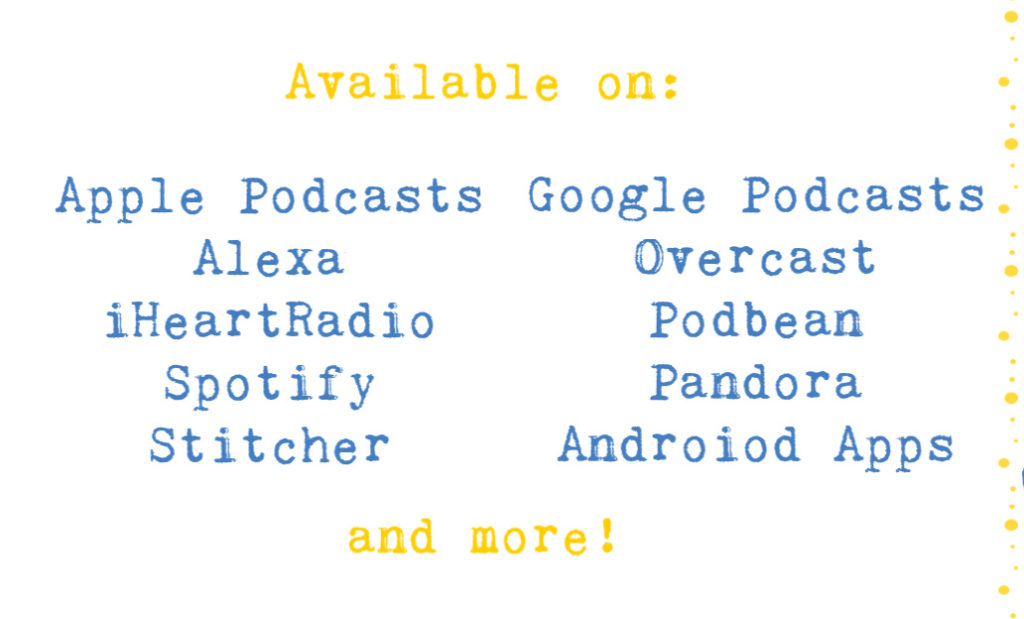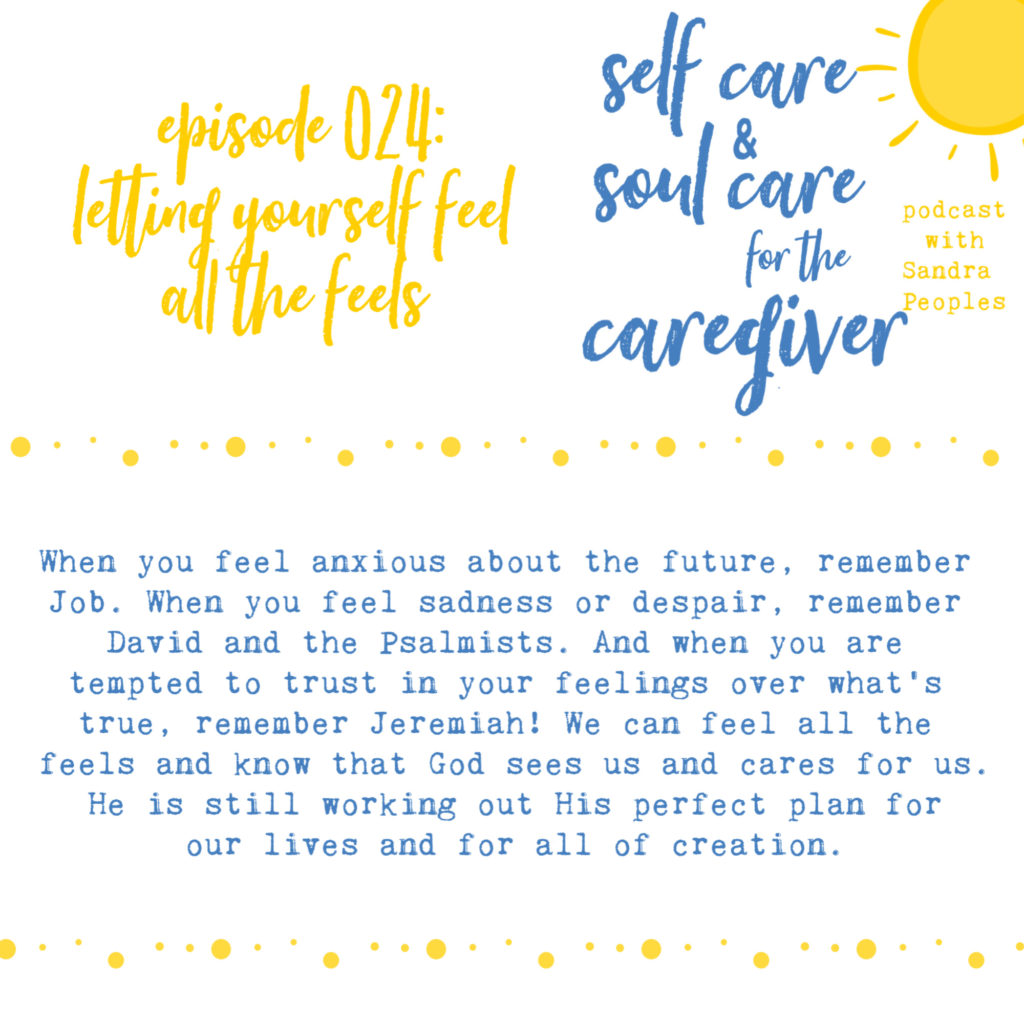Emotions are at an all time high right now, and many of us are tempted to do one of two things: push our feelings down and repress them or let them take over and determine what we believe to be true. I tend to repress my feelings, but they all came bubbling up as we experienced our toughest week in years. Thankfully, there’s no emotion we experience that isn’t reflected in Scripture. In today’s episode we’re going to open to Job, the Psalms, and Jeremiah as we feel all the feels and turn them over to God.

Quick Links:
- Teach Me to Feel by Courtney Reissig
- Episode 22, Writing New Stories for Ourselves
- Self Care for the Special-Needs Mom Facebook group
Transcript:
May 18th, episode 24 Letting Yourself Feel All the Feels
Friends, I’m so glad you’re joining me today for episode 24 of self-care and soul care for the caregiver. I’m your host, Sandra Peoples. I had another topic planned for our time together today, but honestly, we just got through one of the hardest weeks we’ve had in a long time. I think it’s harder than we’ve had in a few years even. My emotions have been all over the place, and I’m not usually an emotional person. So I decided to pivot and talk about that today—feeling all the feels.
A book came out earlier this year called, Teach Me to Feel. It’s not one I normally would have picked up, but my friend Teri Lynne loved it. Her recommendation convinced me to read it. In the introduction, the author Courtney Reissig writes, “Many of us Christian women—in times of crisis, but in normal life too—aren’t sure what to do with our feelings. We struggle to know how to feel ‘Christianly.'” She goes on to say some of us suppress our emotions, telling ourselves we “should” or “shouldn’t” feel certain ways. Especially fear, anger, and envy. Others of us lean toward another temptation—being too controlled by our emotions and letting them determine what we believe, even what we believe about God.
I have always been in the first group—suppressing my emotions. That started when I was young. I grew up as a special-needs sibling. My big sister has Down syndrome. And while she didn’t have high medical needs or tons of therapy appointments once she started school, I felt like my parents needed to pay more attention to her than they paid to me. So I tried to follow all the rules and be a good girl. But I also suppressed what I was feeling and downplayed my needs. It just didn’t seem as important to me as what else was going on in our house. I also have a younger sister, who reacted to life at our house in the opposite way. I grew quieter, and she grew louder. When she was happy, she was super happy and laughed a lot. When she was sad, she was very sad and often cried. We feel into predictable roles—I was the stoic, serious one; she was the fun and dramatic one. Even now, when she walks in a room it lights up. When I walk in a room, most people probably don’t notice.
So you can understand with this background info why I would consider being called “dramatic” to be a pretty big insult. But friends, this time of crisis is a dramatic time! And as hard as I’ve tried to suppress it, and as many “should” statements as I’ve told myself about what to feel and how to express it, now is the time to stop being so hard on myself. As we talked about in episode 22, we can write new stories when the old stories aren’t working for us anymore. And trying to keep the cap on all my emotions certainly isn’t working anymore.
The good news is it wasn’t designed to work that way. I wasn’t designed to work that way. Emotions are a gift from God! We were designed with the capacity to feel so many different emotions—so many it’s hard to count them all! The Pixar movie Inside Out represented Riley’s 5 basic emotions, Joy, Sadness, Fear, Disgust, and Anger. Robert Plutchik was a psychologist who believed there are 8 basic emotions that overlap. The basic eight are anger, fear, sadness, disgust, surprise, anticipation, trust, and joy. He then created a wheel of emotions that showed the overlap and expansion of these emotions. For example, sometimes I feel angry. But when I sit with that anger and ask myself what’s really going on, I can be more specific. I’m actually annoyed. Or disappointed. Or frustrated.
Of course there are physical reasons for moods as well. We talked about that back in episode 20 on self-care during your cycle. Hormones play a part in our moods. So does blood sugar, or how well you slept, or that pain in your knee. My son James is 12 and is mostly nonverbal. When he gets grumpy, we ask ourselves a few questions: Is he hungry? Is he tired? Does his tummy hurt? It’s so effective, I’ve been asking myself similar questions when I get grumpy: am I hungry, tired, or in pain?
Over the last few weeks the answer to at least a couple of those questions is almost always yes. It feels like I’m always hungry, tired, or in pain (like with a headache). But the emotions during this season aren’t just due to physical reasons. Friends, we are living through a time unlike any other. We are scared. Really, truly scared. We are weary. We are discouraged. We may be angry. We wake up each morning facing the same old routine but not knowing when “normal” will return or what our new normal will look like.
And up until last week, I thought I was handling all those complex emotions ok. But then reality set in for me in new ways. Here’s a summary of all my feels: I realized how much I missed seeing the friends I usually see at the speaking events that got canceled in the spring. We live all over the country, so we don’t see each other often. Then I started doubting the future of my job. I’m a writer and a speaker who doesn’t currently have time to write a book and there aren’t any speaking events to go to. On top of that, Lee had surgery on his hand a couple days before Mother’s Day. So I was doing things around the house he usually does, feeling resentment and unappreciated. Then James started having bad reactions to the medicine he was taking to help his OCD and bi-polar tendencies. (We’re still dealing with the reaction and deciding what to do.) To top it all off, James went to therapy last Wednesday morning and had to come right back home because his temperature at the time was over their limit. He can’t go back for two weeks. Y’all—that’s like the perfect storm for some high drama! Just some of the emotions I can name from the last week and a half include sadness, loneliness, disappointment, grief, resentment, exhaustion, neglect, confusion, weariness, fear, and at times, hopelessness.
Where do we turn in times like these? There are a few good answers, like talking to friends and family members. But there’s one best answer: we open Scripture. There are three places in Scripture that I want to focus on for the rest of our time together: the book of Job, the Psalms, and the book of Jeremiah. Let’s see how gracious and patient God is with us, His beloved children. Let’s find hope to meet us in our greatest need. And let’s remind ourselves about what is true when we are tempted to trust our feelings instead of God.
We always end with prayer, but today I want to pause and pray right now. Because I believe every one of us needs to hear one of the next three points we’re going to discuss. As you experience so many emotions, one of these may rise to the top and be like the message your heart needs as we start a new week. So let’s pray.
God, my friends and I are feeling all the feels right now. But we want to take time to look at what Your word says and the truth we can find there. If my friend listening right now is feeling scared or confused, help her to hear the message of Job. If she is feeling sad or hopeless, help her to hear the message of David and the Psalmists. And if she needs to be reminded that Your truth is supreme even over our feelings, help her to hear the message of Jeremiah. Your Word is living and active, sharper than any two-edged sword, piercing to the division of soul and of spirit, of joints and of marrow, and discerning the thoughts and intentions of the heart (Heb. 4:12), and we come to You asking for Your comfort and hope. In Jesus’s name we pray, amen.
Let’s start in Job. It’s such a comforting book for confusing times. When I’m tempted to think, Woe is me! I have the worst life of everyone who has ever lived!I remember Job. He suffered in unimaginable ways. Chapters 1 and 2 outline the events. Then he spends the rest of the book talking to God, talking to his friends and hearing their mostly bad advice, and then he hears from God. Let me hit some of the highlights for you: in chapter 7 verse 11 he says
“Therefore I will not restrain my mouth;
I will speak in the anguish of my spirit;
I will complain in the bitterness of my soul.”
In verse 16 of the same chapter he says,
“I loathe my life; I would not live forever.
Leave me alone, for my days are a breath.”
He says to his friends in 16:1, ” … miserable comforters are you all.” Maybe in part because the comfort from his friends fails to comfort him, he continues pouring out his heart to God, asking for His presence. In 23:3 he cries out, “Oh that I knew where I might find him, that I might come even to his seat!” Then in chapter 38 God answers Job. He is patient and gracious with Job, but He is also direct. For verse after verse God reminds Job of His power and plan. God laid the foundation of the earth, not Job. He commands mornings and evenings. He controls the waves, the deep, the rain, the hail, the stars, the clouds, the lions and their prey. God goes on and on until Job fully understands, and he responds,
“I know that you can do all things,
and that no purpose of yours can be thwarted.” (42:2)
How is that comforting to me right now? It reminds me that God’s plan is steady, sure, and ultimate. When I turn on the news and each talking head is blaming someone else, I remind myself that God is over it all. And it will work out for His glory and our good somehow! That alleviates my fears. It quiets the worries that keep me up at night. And it gives me hope for tomorrow and every day after that.
There are other emotions I feel in regular rotation right now—sadness is at the top of that list. When I’m feeling sad, I turn to the Psalms. Now, in the spirit of honesty, the Psalms are not my favorite book of the Bible. You can probably guess that someone who suppresses emotions wouldn’t want to hang out in a very emotional book of the Bible. In fact, I’ve said before that David is one of my least favorite biblical characters because he was sooooo dramatic. But in seasons like we’re in now, it’s nice to turn to the longest book in the Bible and realize we aren’t alone in our roller coaster of emotions. I’m not the first to feel sad, weary, or scared. When I find myself saying, “you should feel this” or “you shouldn’t feel that,” I can read about David and other Psalmists who wrote so honestly about how they felt. Way back when this season started, I encouraged us to pick a verse that we would hold on to. My verse was Psalm 62:8,
“Trust in him at all times, O people;
pour out your heart before him;
God is a refuge for us.”
I’ve read that verse over and over in the last week and a half, reminding myself of its truth: we can trust in him at all times, we can pour out our hearts to him, and he is a refuge for us. If you are sad, confused, or unsure of even how you feel, spend some time in the Psalms today. Find a verse that reflects how you feel. Then remind yourself of the truth—that God cares for you and comforts you.
Finally, let’s turn to Jeremiah, the weeping prophet. He can be our guide when we’re tempted to believe what we feel instead of what we know to be true. Chapter 12, verse 1 starts out, “Righteous are you, O Lord …” Derek Kidner was a British Old Testament scholar who wrote, “It was wise of Jeremiah (and an example worth following) to precede what he could not grasp with what he could not deny.” I put this into practice back when we got James’s autism diagnosis. I couldn’t grasp it. I couldn’t imagine anything good could come from it. But what I knew, what was stronger than my confusion or my doubt, was the truth of God’s love. So I repeated to myself, “God loves me; God loves James.” I repeated it until I believed it. I focused on what I could not deny when facing something I could not grasp.
Jeremiah lived in a confusing time, when there were many messages about God and what he was doing during that season of judgment and destruction. When what he saw around him was too overwhelming, he had to look up and be reminded of God’s truth. In chapter 17 he wrote,
“Blessed is the man who trusts in the Lord,
whose trust is the Lord.
He is like a tree planted by water,
that sends out its roots by the stream,
and does not fear when heat comes,
for its leaves remain green,
and is not anxious in the year of drought,
for it does not cease to bear fruit.”
We can live like this! We can send out roots to the source of truth—God’s Word! And when we do, we don’t have to fear. We don’t have to be anxious. We can still bear fruit, even during this time because God is working in us!
So friends, when you feel anxious about the future, remember Job. When you feel sadness or despair, remember David and the Psalmists. And when you are tempted to trust in your feelings over what’s true, remember Jeremiah! We can feel all the feels and know that God sees us and cares for us. He is still working out His perfect plan for our lives and for all of creation.

Thank you for joining me today! Spending this time in the Word with you has filled me with hope to face another week. Remember that no matter how you are feeling, you aren’t alone. If you need friends to walk alongside you and encourage you, join my Self Care for the Special-Needs Mom Facebook group. One of our rules is that we lead with empathy, not answers. (That’s a lesson we learned from the bad example of Job’s friends!) So it’s a safe place to feel all the feels and be reminded of the Truth.
If you have time before you log out of the app, take a minute to write a review and give a 5-star rating to help other caregivers like us find hope and encouragement! We all need as much as we can get during this season! I’m praying for you this week, and I’ll meet you back here next Monday morning!




